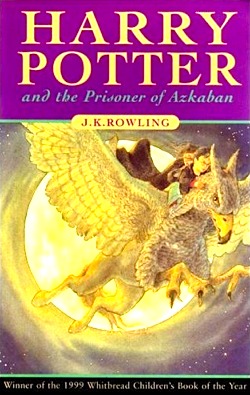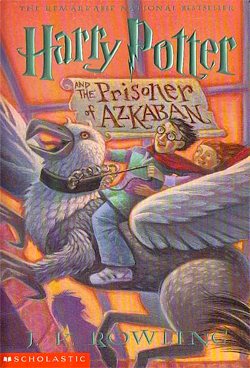I started reading the Harry Potter books right after Prisoner of Azkaban was first published, which coincided with the general rise of the Harry Potter fandom. Fans and people in mainstream started to recognize that these books weren’t “just for kids” or, in the eyes of my angsty teenage self, as being “Okay to be seen reading on the bus.”
While I enjoyed Harry Potter and the Sorcerer’s/Philosopher’s Stone and Chamber of Secrets, they still came off as a bit . kiddish (remember, I was a little more than a kid myself at the time, so I was snobbish about those things). They were fun, I enjoyed them, but I didn’t want to be Harry after the first book and that vainglorious git Lockhart and the house elf Dobby both annoyed me to no end in the second, so I wasn’t eager to pick up the third book. But pick it up I did, primarily because my little sister got the book, so I might as well read it, too. And once I closed the covers to the Prisoner of Azkaban, I read it again. Immediately. The fandom bug bit me and I became a fangirl.
Why that happened is obvious: Prisoner of Azkaban‘s tone is emotionally darker than the previous books. The Dementors that steal happiness lurk on every corner, an escaped mass murderer bent of revenge is on the loose, and death omens pop up left and right. Alongside these growing threats, Harry becomes more aware of the complexities of the adult world; at the same time, however, he’s negotiating with his own teenage insecurities. How can he hang out at cool places like Hogsmeade if he can’t get Uncle Vernon to sign his permission slip? Does fainting in the presence of a Dementor mean he’s a coward? Would he be able to play Quidditch again once his Nimbus Two Thousand becomes campfire fodder? Prisoner of Azkaban captures the beginnings of Harry’s adolescence before the arrival of the caplocked rage, romantic entanglements, and endless page counts that tended to bog down the later books. Moreover, the third book combines the right amount of adventure and suspense while also complicating the picture by hinting at a past when people didn’t think Voldemort was the only bad guy but that anyone could’ve been. And the results of the cultural trauma during that time period didn’t fade away after the Dark Lord’s presumed defeat at Godric’s Hollow.
But the connection I felt with Harry’s teenage journey and my own wasn’t the only reason why I became a Harry Potter fangirl, and neither were the darker themes.
The story of the Marauders pulled me into fandom, head-over-heels.
A part of Harry’s developing maturity is his growing awareness of his parents’ lives. Prisoner of Azkaban is the first time readers glimpse a bit of the wizarding past, during a time of war, mistrust, and anxiety. Because Harry’s position in this book is that of a child observing adults, we readers are teased with bits and pieces of information and unexplained character tensions between the grown-ups around him. Does Snape hate Lupin because he took the coveted DADA position, or is it something more? Why does talk about the Marauders and Sirius Black affect Lupin so much? How can Harry protect himself from Black’s hell-bent desire to get rid of him? Harry’s point of view provides enough misdirection to give readers a complete 180 when the truth is finally revealed in the Shrieking Shack. That in itself is a masterful feat of storytelling on Rowling’s part.
Not only does Rowling win in terms of planting red herrings, but Prisoner of Azkaban wins for great use of plot devices and secondary characters. Time travel gets a genre crossover into children’s fantasy, and Hermione shows just how damn clever she is by her ability to use it. The Whomping Willow is more than just for smashing wayward cars and broomsticks, and it being a key plot point in this book started the trend of micro-analyzing previous books for other clues about future ones. Professor Trelawney, as ridiculous and melodramatic as she is, serves as timely comic relief in a book that contained so much darkness, and actually proves her prediction prowess later on. Buckbeak the hippogriff was always my ride of choice, and in the end, becomes the perfect companion for a fellow convict on the run.
 And of course, there are the Marauders themselves, and one of the great character-based strengths of the novel is that they are described from so many conflicting perspectives. There’s the “common knowledge” tale in the wizarding community, where Black is the traitor who goes insane and Peter Pettigrew, the boy who “hero-worshipped Black and Potter” is hailed as a hero. There are the Messrs. Moony, Wormtail, Padfoot & Prongs, the jokester teens who were smart enough to create the Map for their own amusement and become Animagus in the name of friendship. Then, there are the Marauders grown old: Lupin suffering from the effects of lycanthropy and unemployment, Black driven to near insanity after years of imprisonment, Pettigrew a sickly, simpering rat both literally and figuratively. James is present even though he’s gone, most strongly represented as Harry’s stag Patronus (and Lily is there too, in the form of a traumatic recalled memory). Thus, Harry—and the reader—gain an understanding of how terrible the threat of Voldemort had been by how these secondary characters become fully formed in our eyes, defined piecemeal throughout the book by their most joyous and most tragic memories.
And of course, there are the Marauders themselves, and one of the great character-based strengths of the novel is that they are described from so many conflicting perspectives. There’s the “common knowledge” tale in the wizarding community, where Black is the traitor who goes insane and Peter Pettigrew, the boy who “hero-worshipped Black and Potter” is hailed as a hero. There are the Messrs. Moony, Wormtail, Padfoot & Prongs, the jokester teens who were smart enough to create the Map for their own amusement and become Animagus in the name of friendship. Then, there are the Marauders grown old: Lupin suffering from the effects of lycanthropy and unemployment, Black driven to near insanity after years of imprisonment, Pettigrew a sickly, simpering rat both literally and figuratively. James is present even though he’s gone, most strongly represented as Harry’s stag Patronus (and Lily is there too, in the form of a traumatic recalled memory). Thus, Harry—and the reader—gain an understanding of how terrible the threat of Voldemort had been by how these secondary characters become fully formed in our eyes, defined piecemeal throughout the book by their most joyous and most tragic memories.
More importantly to this fangirl, though, is Remus Lupin. To Harry, he is one of his first mentors. Unlike Dumbledore’s distant and quirky paternalism, Molly’s coddling, or Hagrid’s chummy friendship, Remus Lupin is the first adult who treats Harry as someone who can make decisions and respects them. He also guides Harry’s judgment, asking him to rethink his assumptions about Sirius and about himself. When Harry fears his own cowardliness, for example, he confides in Lupin; in return, Harry is not belittled or comforted but is reassured of his ability when Lupin offers him Patronus lessons.
Throughout the book, Harry goes to Lupin for advice and information in a way that he hadn’t been able to with other teachers. In Prisoner of Azkaban, Lupin is the Marauder that becomes the father figure Harry needs, the one that James was unable to be and that Sirius wanted to be so badly.
Character-wise, Lupin is the most mysterious figure, second to Sirius. He’s also got a high angst factor, though he never reveals it. (Countless fanfics have made up for that!) Lupin is controlled by the secrets and lies placed upon him by circumstance and society. During his time at Hogwarts, Lupin is forced to hide his lycanthropy, to lie about his Animagus friends to his most trusted mentor, to cope with the betrayal that left him friendless and abandoned for years. In some sense, the constant subterfuge Lupin plays becomes second nature to him: feigning sleep on the train to Hogwarts, lying through his teeth about the Marauder’s Map to Snape, hiding his reactions about Sirius, holding back a comforting hand when Harry confesses to hearing Lily’s final pleads. At the same time, his guarded control makes him a target of suspicion—no wonder Hermione accused him of being in league with Voldemort!
Like with the house elves and the term “Mudblood,” Rowling shows us another form of oppression in the wizarding world through werewolf discrimination. More significantly, Lupin’s experiences and reactions reveal how damaging microaggressions can be. At the same time, however, his triumph over the emotional and physical burdens he bears makes him an admirable character. Lupin’s subtle strength, his undeniable intelligence, his dry wit, and even his emotional restraint were all draws for legions of fans, including myself (and legions of shippers as well. Puppy love forever!)
Prisoner of Azkaban ends with uncertainty. Pettigrew escapes, Lupin resigns, Black is on the run but despite all of this, Harry is still left with hope. For the first time, he realizes that he has options besides life with the Dursleys, and knowing that he has other family out there—in the form of his parents’ old friends—is enough for him for now.
Ay-leen the Peacemaker freely admits that she has an unfinished Remus Lupin fanfic novel floating on the interwebz somewhere, and her plot notes are shoved in a box in her attic. One day, perhaps, she’ll release them for infamy to those who still remember it. In the meantime, she runs the multicultural steampunk blog Beyond Victoriana.










